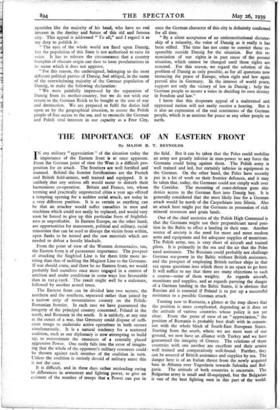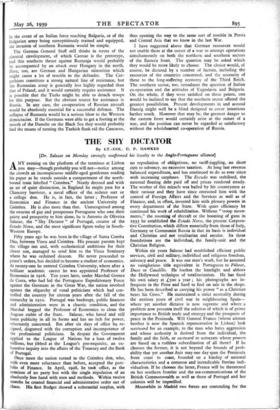THE IMPORTANCE OF AN EASTERN FRONT
By MAJOR B. T. REYNOLDS
IN any military " appreciation " of the situation today the 1 importance of the Eastern front is at once apparent. From the German point of view the West is a difficult pro- position for an attack. The frontiers are well fortified and manned. Behind the frontier fortifications are the French and British field-armies, well trained and equipped. It is unlikely that any serious rift would occur to disturb their harmonious co-operation. Britain and France, too, whose teeming and practically unprotected cities a year ago offered a tempting opening for a sudden aerial attack, are today in a very different position. It is as certain as anything can be that an attacker would suffer casualties in men and machines which could not easily be replaced, and would very soon be forced to give up this particular form of frightful- ness as unprofitable. In Eastern Europe, on the other hand, are opportunities for manoeuvre, political and military, racial minorities that can be used to disrupt the victim from within, open flanks to be turned and the raw materials which are needed to defeat a hostile blockade.
From the point of view of the Western democracies, too, the Eastern front is of paramount importance. The prospect of attacking the Siegfried Line is for them little more in- viting than that of tackling the Maginot Line to the Germans. If war should come, and there be no Eastern front, we would probably find ourselves once more engaged in a contest of attrition and under conditions in some ways less favourable than in 1914-1918. The result might well be a stalemate, followed by another armed truce.
The Eastern front can be divided into two sectors, the northern and the southern, separated rather than joined by a narrow strip of mountainous country on the Polish- Rumanian frontier. In each case we have guaranteed the integrity of the principal country concerned; Poland in the north, and Rumania in the south. It is unlikely, at any rate at the outset of a war, that Germany could dispose of suffi- cient troops to undertake active operations in both sectors simultaneously. It is a natural tendency for a scattered coalition, such as our diplomacy is now attempting to build up, to overestimate the resources of a centrally placed aggressive Power. One easily falls into the error of imagin- ing that the whole of the opponent's military resources could be thrown against each member of the coalition in turn. Unless the coalition is entirely devoid of military sense this is not the case.
It is difficult, and in these days rather misleading owing to differences in armament and fighting power, to give an estimate of the number of troops that a Power can put in the field. But it can be taken that the Poles could mobilise an army not greatly inferior in man-power to any force the Germans could bring against them. The Polish army is well trained and led, but certainly inferior in equipment to the German. On the other hand, the Poles have recently put in a lot of work on their frontier defences, and it may be taken that, today, the Germans could not simply walk over the Corridor. The mounting of coast-defence guns also denies access to the German fleet into Danzig bay. It is generally considered that the most likely line for a German attack would be north of the Carpathians into Silesia. Also an attack here might put the Germans in possession of rich mineral resources and grain lands.
One of the chief anxieties of the Polish High Command is that the Germans might use their preponderant naval posi- tion in the Baltic to effect a landing in their rear. Another source of anxiety is the need for more and more modern arms and equipment and for adequate supplies of munitions. The Polish army, too, is very short of aircraft and trained pilots. It is primarily in the sea and the air that the Poles need assistance. The Russians could probably not challenge German sea-power in the Baltic without British assistance, and the prospect of employing British surface ships in that sea opens questions into which there is no space to go here. It will suffice to say that there are many objections to such a course—some of them weighty. As regards aircraft, munitions and supplies, and as regards parrying the danger of a German landing in the Baltic States, it is obvious that Russian aid is essential if Poland is to put up a successful resistance to a possible German attack.
Turning now to Rumania, a glance at the map shows that the position is more complicated, depending as it does on the attitude of various countries whose policy is not yet clear. From the point of view of an "appreciation," the position of Rumania is probably best dealt with in connex- ion with the whole block of South-East European States. Starting from the south, where we are most sure of our ground, we now have an alliance with Turkey and we have guaranteed the integrity of Greece. The relations of these countries with one another are excellent and their armies well trained and comparatively well-found. Further, they can be assured of British assistance and supplies by sea. The danger here is of an Italian thrust from the newly acquired base in Albania over Yugoslavia towards Salonika and Bul- garia. The attitude of both countries is uncertain. The Bulgarian army is small and ill-equipped, but the Bulgarian is one of the best fighting men in this part of the world. In the event of an Italian force reaching Bulgaria, or of the Bulgarian army being surreptitiously trained and equipped, the invasion of southern Rumania would be simple.
The German General Staff still thinks in terms of the classical envelopment, of which Cannae is the prototype, and this southern thrust against Rumania would probably be accompanied by an attack over Hungary in the north. Here, too, are German and Hungarian minorities which might cause a lot of trouble to the defender. The Car- pathians constitute a strong natural line of resistance, but the Rumanian army is generally less highly regarded than that of Poland, and it would certainly require assistance. It is possible that the Turks might be able to detach troops for this purpose. But the obvious source for assistance is Russia. In any case, the co-operation of Russian aircraft would be absolutely essential for a successful defence. The collapse of Rumania would be a serious blow to the Western democracies. If the Germans were able to get a footing at the mouth of the Danube on the Black Sea they would probably find the means of turning the Turkish flank vid the Caucasus, thus opening the way to the same sort of trouble in Persia and Central Asia that we knew in the last War.
I have suggested above that German resources would not enable them at the outset of a war to attempt operations simultaneously on both the northern and southern sectors of the Eastern front. The question may be asked which they would be more likely to choose. The choice would, of course, be dictated by a number of factors, including the resources of the countries concerned, and the necessity of these to the long-suffering economy of the Third Reich. The southern sector, too, introduces the question of Italian co-operation and the attitudes of Yugoslavia and Bulgaria. On the whole, if they were satisfied on these points, one would be inclined to say that the southern sector offered the greatest possibilities. Present developments in and around Danzig might well be a blind designed to cover intentions farther south. However that may be, the greatest danger to the eastern front would certainly arise at the outset of a war, and the position can never be regarded as satisfactory without the wholehearted co-operation of Russia.



























































 Previous page
Previous page